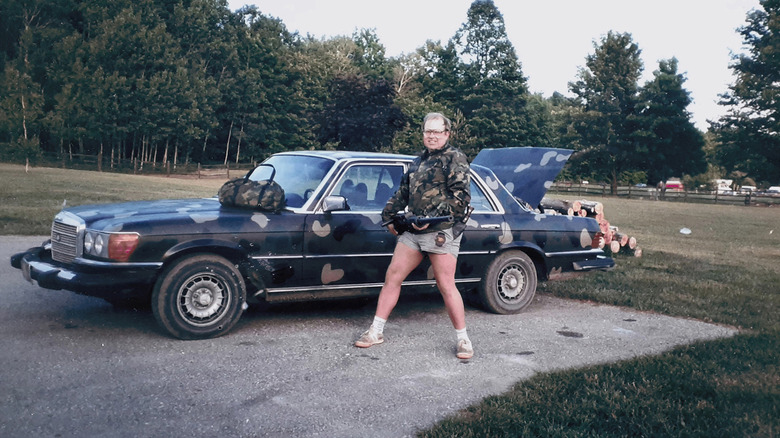2nd Chance Review: The Wild True Story Of The Inventor Of The Bulletproof Vest [Sundance 2022]
This is the story of Richard Davis. After not one but two different pizza shops owned by Davis burned to the ground in 1969, Davis moved on to something different: Inventing the modern-day bulletproof vest. To prove it worked when he was just getting started out, Davis staged demonstrations in which he would slap on the vest and then shoot himself point-blank in the chest. Over the years, he did this a total of 192 times, which is obviously a record, and one that the documentary "2nd Chance" leads with.
Ramin Bahrani's doc follows Davis' strange path to success, with Davis himself front and center (sitting in a comically large armchair) to offer colorful anecdotes about his life and career. At first blush, Davis seems like a lovable goofball. Sure, he's clearly obsessed with guns, but he's also fast with a joke and fond of making his own low-budget action movies to promote his products. But there's more to the Richard Davis story. As "2nd Chance" unfolds, Bahrani slowly but methodically reveals the many questionable, problematic events in the life of the man who invented the bulletproof vest. Whenever Bahrani presents these finds to Davis, Davis himself is quick to deny them. He laughs them off, downplays them, or claims they didn't happen at all.
In the eyes of Richard Davis, Richard Davis is a hero. His bulletproof vests saved lives, and he went so far as to start a running list of names of all the people who were shot but lived thanks to one of Richard's vests. One such person was Aaron Westrick, a police officer who was shot and lived — and then came to work for Richard's company, Second Chance. If Davis is the ultimate villain of the piece, Westrick ends up being something akin to a hero. Perhaps that's too extreme. But Bahrani takes pains to illustrate that Westrick has a good heart, and the film gives him something of a mini-arc involving his shooting and the aftermath. I won't say any more because it's best experienced fresh, but "2nd Chance" makes a point of illustrating that Westrick is not some bloodthirsty gun nut.
The same can't be said for Richard Davis, who gives us an elaborate story about how he gunned down three criminals while delivering a pizza back in the '60s. Bahrani does some digging and is unable to find anything that confirms Richard's story. But that doesn't matter to Richard. The pizza shooting is part of his lore. It's his origin story.
An Interesting Story That's Missing Something
Throughout the course of "2nd Chance," Davis himself remains a bit of an enigma. It's difficult to figure out what makes this guy tick — other than guns, guns, and more guns. Perhaps that's it. Perhaps all Richard Davis enjoys is firing large weapons in open fields, because there's certainly a lot of footage of that. Davis has seemingly countless hours of himself spraying machine guns or blasting cars with artillery shells until they burst into flames. He's also directed a slew of cheap action flicks based on the true stories of the people who wear his vests — although Aaron Westrick points out that Richard got a lot of the facts wrong when he staged a recreation of Aaron's shooting.
No matter. The truth is inconsequential. All that matters is whether or not Richard has a story that's good for business. Throughout his career, we're told he would travel to various police stations and show them his sensationalized films, all in the name of scaring the cops into buying his products. There's an absurdity to all of this, and we can laugh despite the implications of it all. And, sure, it could be argued that for all his flaws, Richard has done good things. His vests have indeed saved lives.
At least for a while. But then we learn that Richard introduced a new material for his vests — Zylon. The benefit: Zylon was ultra-light. But here's the thing: It was perhaps too light, because it failed to actually stop bullets. Worse, Richard was apparently aware of this, as internal memos from his company sure suggest so. And yet, he still allowed the vests to be sold and not just to law enforcement, but to the military in the wake of 9/11 and the so-called War on Terror. But again, Ricard Davis doesn't seem very broken up about any of this. It's just business.
Bahrani's doc moves at a steady pace, but it also runs through bullet points rather than taking a deeper dive into Richard and his life. There's one particularly memorable, haunting moment where we see footage of Richard donning one of his vests and allowing his father to shoot him. Rather than just shoot him once, Richard's dad keeps shooting his son, again and again. It's the type of moment worthy of a Greek tragedy, crying out for analysis, but it comes and goes rather quickly, accompanied with the information that Richard always tried to please his father. And then the film moves on from this topic almost as quickly as it introduced it.
Ditto an earlier moment when one of Richard's ex-wives states that Richard "desperately needs to be loved by other people." It's a loaded statement, but there's no time to swell on it. Ultimately the entire film feels like this — too quick, unconcerned with lingering. There has to be more to the Richard Davis story. Someone else should give it a try. Of course, after being exposed so much here, Richard probably won't want to sit down in that comically huge armchair for another tell-all interview. Then again, seeing as he clearly loves being in the spotlight, he just might.
/Film Rating: 6 out of 10

